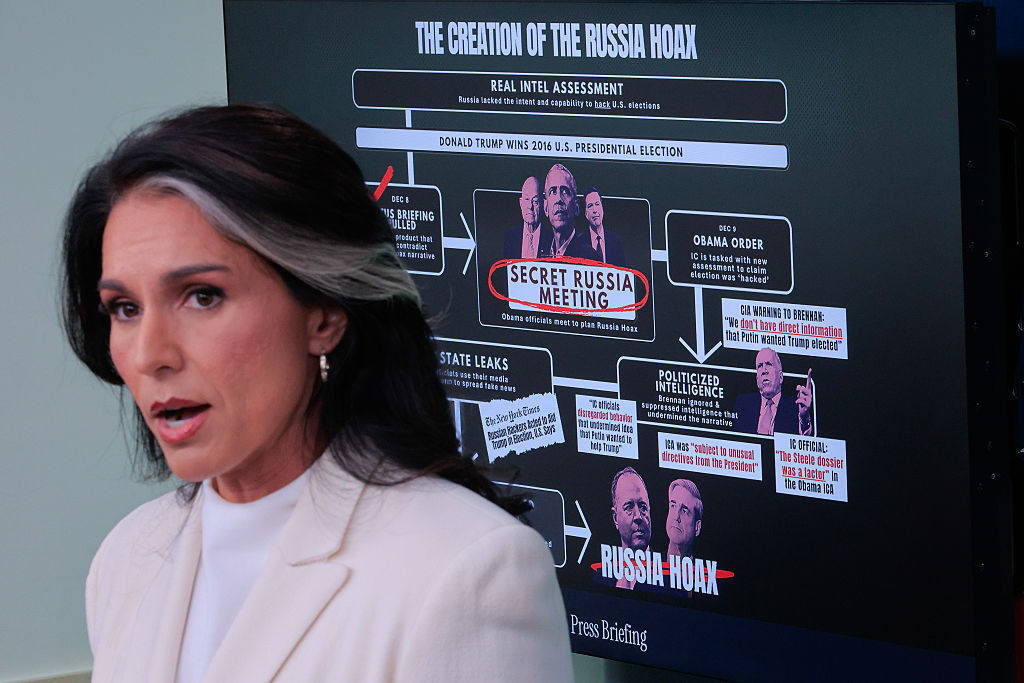
During a White House briefing on Wednesday, Gabbard contended that Obama and his top national security aides “directed the creation of an intelligence community assessment that they knew was false. They knew it would promote this contrived narrative that Russia interfered in the 2016 election to help President Trump win, selling it to the American people as though it were true. It wasn’t.”
Gabbard’s allegations center on the outgoing Obama administration’s investigation into Russian interference before and after Trump’s November 2016 election. In a 2017 report by the CIA, FBI, and National Security Agency—published two weeks before Trump’s inauguration—officials assessed that Russian President Vladimir Putin “developed a clear preference” for Trump and acted upon it by attempting to sabotage the campaign of former Secretary of State Hillary Clinton through cyber operations. The agencies noted that they had “high confidence” in their assessment, which was produced in an unusually short time period.
Gabbard now claims the findings were fabricated on Obama’s orders. DNI’s smoking gun? A 2017 review by the Republican-led House Intelligence Committee, which cast doubt on the Obama administration’s conclusion that Moscow tried to influence the outcome of the election one way or another, as opposed to sowing general discord. The lawmakers concluded that the Kremlin viewed a Clinton presidency as inevitable, even going so far as to hold back compromising information on the Democratic nominee with plans to leak it after her inauguration.
The authors went on to argue that the information Russia ultimately leaked about Clinton—which included the email correspondence of her campaign chair—was “far less damaging” to her candidacy than what was withheld. According to the report, Moscow had unearthed and sat on emails between Democratic officials detailing Clinton’s “intensified psychoemotional problems” and daily use of “heavy tranquilizers” on the campaign trail. Her team also allegedly held covert meetings in which State Department officials offered American religious organizations, in exchange for their support, “significant increases in financing” from the department.
But did the Obama administration’s 2017 report rise to the level of fabrication? The House committee didn’t seem to think so, despite Gabbard’s summary of its findings. The lawmakers faulted the Obama team for rushing the report and relying on shaky intelligence, but their recommendations largely focused on improving future assessments. And they certainly didn’t make the case for criminal prosecution.
Nor did the 8-year-old report’s release bring much new information to light. The House’s conclusions closely aligned with CIA Director John Ratcliffe’s June “lessons-learned review,” which criticized the Obama team over its procedural errors and crunched timeline. Likewise, in his 2023 report on the probe into alleged Russian interference, special counsel John Durham detailed political biases and unprofessional conduct on the part of Obama’s intelligence community. But, he noted, “not every injustice or transgression amounts to a criminal offense.”
The Trump administration’s new case also conflates allegations that Russia attempted to rig the 2016 election by hacking voting machines with claims that it sought to influence its outcome through other means, like online influence campaigns and phishing operations to obtain damaging information on Clinton.
In a press release last Friday, Gabbard’s office highlighted an excerpt from an email in the lead-up to the election in which an intelligence official said Russia is “probably not trying … to influence the election by using cyber means.” Taken alone, the private correspondence could indicate that the intelligence community later doctored its public report alleging Russian cyber interference. But the full message, included in the documents released last week, tells a different story: “Russia probably is not trying to going to be able to? [sic] influence the election by using cyber means to manipulate computer-enabled election infrastructure. Russia probably is using cyber means primarily to influence the election by stealing campaign party data and leaking select items, and it is also using public propaganda.”
That conclusion squares with public statements by Obama and subsequent probes, including a 2020 review by a bipartisan Senate Intelligence Committee. In a nearly 1,000-page report—the product of a three-year investigation into Russian election interference—the committee said that, while there was no evidence that Moscow had successfully altered vote counts, it had conducted extensive influence and hacking operations ahead of the election. “We found irrefutable evidence of Russian meddling,” Secretary of State Marco Rubio, then-chairman of the Senate committee, said at the time.
Flash forward five years, and Republican lawmakers are now pushing for yet another probe into the government’s handling of Russiagate. Democrats, meanwhile, continue to deny any wrongdoing—professional or otherwise—on the part of Obama and his team.
“You’ve got two narratives about what Russia was doing in 2016. You’ve got the Democratic narrative, you’ve got the Republican narrative. They’re both incomplete,” our colleague Michael Warren said on today’s episode of The Dispatch Podcast. “It just feels like a rehash of these arguments that we’ve been having, where both sides are really kind of yelling past each other and not really interested in finding out any kind of truth.”

















